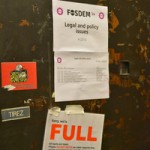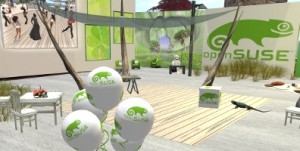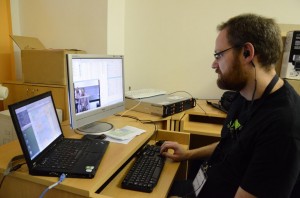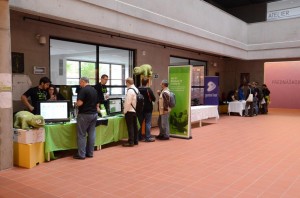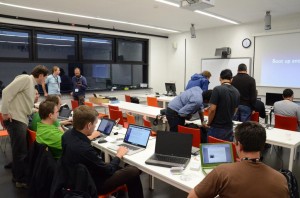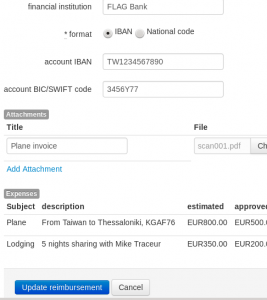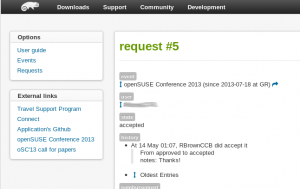So yes, I attended oSC 14, gave a talk, attended some others, ate some food, didn’t drink nearly as much beer as I thought I would. Which can be good, or bad, depending on your perspective…..
My GF and I (who incidentally, while quite a bright girl, and a programmer of sorts, knows pretty much nothing about openSUSE, or linux in general….) arrived into Dubrovnik on Thursday, about 1600 local time, got checked into the hotel, which incidentally was rather nice, if you’re in the mood for visiting Dubrovnik someday, the Rixos Libertas is good stuff.
We headed down to the meet and greet, unfortunately, we were a bit late, so we missed out on the refreshments, but things went well enough, for never having met any of the folks there.
The next morning, we managed to get moving late, and miss the keynote, which I’m sure was quite good. The 11:30 session I wanted to attend was cancelled (and I can’t recall what it was, as it is removed from the schedule), so we walked down into town to grab some lunch. Unfortunately, we chose poorly. The food was excellent, but the service a bit slow, so we missed the first part of the mysql talk after lunch. What we did catch was quite good, and certainly gave me some ideas for hardening mysql installations, the next time I need to put one together.
The next session we went to was the Design and Branding session, which was certainly enlightening, seeing some of the new logo ideas, and how “official” colours and fonts are selected. We then attended the Suse Linux Enterprise and openSUSE session. It was a bit enlightening, getting a little better idea of how SLE and openSUSE interact, I wouldn’t say I’m “clear” on everything, but I have a better idea. The YaST devel collaboration session was next, which honestly, was a bit over my head, but to be fair, I didn’t look at the summary quite closely enough. The last session we attended that day was the Spec-cleaner session, which was really good. I’ve been using the heck out of it since I got back, getting my spec files nice and clean, and conforming a bit better to design guidelines.
On Saturday, we got up and moving on time, had some breakfast at the hotel, and then headed to the conference, and caught Jos Poortvliet’s presentation on KDE, which gave a nice overview on where KDE is headed with Frameworks 5. After lunch we attended the Ruby on Rails workshop, and while I wasn’t able to really do the workshop due to some network issues (mainly, I couldn’t get the appropriate stuff installed during the workshop), but since getting home, I’ve worked through it, and while I certainly don’t consider myself fluent in ruby on rails now, I certainly do know how to get a project started, and feel comfortable bashing around in there to sort things out.
My talk on Bodega was after the mid-day break, and fairly well attended, and luckily Jos was there to save my arse on a few points I’d forgotten to put in my presentation. I think it went fairly well there, especially considering I don’t have any code committed yet.
The last session we attended Friday was the Btrfs, LVM, and Snapper session, where I picked up a better understanding of how to work with snapper and btrfs. That night, we hooked up with Jos and coolo, and a couple other guys (who’s names I don’t remember, sorry), and spent a bit wandering around, looking for a place to get some dinner, which did seem to take an absurdly long time. But the food was good, although my feet certainly were tired by the time we got back to the hotel.
Sunday morning, my girlfriend was feeling a bit under the weather, so the only sessions I actually attended were the 1130 openSUSE community meeting, where I got a little better idea of who makes up the community, and some other things, perhaps that I misunderstood about how the community works, and the Afternoon openQA session, where I got an excellent workshop on how to write openQA tests. I haven’t had much chance to mess with it since I got home, but I certainly will be using it.
Monday, I attended Robert’s KIWI presentation, where things were a bit hampered, due to either folks not having capable hardware, or having network issues (me), so nobody got to really do the workshop. But once again, now that I’ve gotten home, I’ve been able to work through Roberts workshop, and if you’re interested in using Kiwi, I *highly* recommend getting a copy of it, and going through it.
And that concludes my trip to Dubrovnik, other than a very long and uncomfortable flight back to the states.
